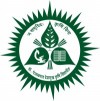| About Project | 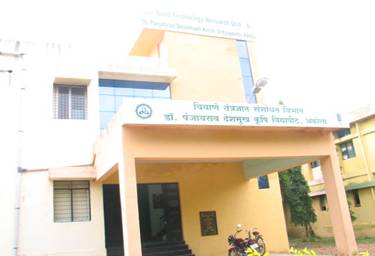 | |
| Agro Climatic Information | ||
| Infrastructure | ||
| Mandate | ||
| Objectives | ||
| Scientists Information | ||
| Research Activities and Achievements | ||
| Research Recommendations | ||
| Extension Activities | ||
| Contact Information |
About Project

The seed technology research unit is one of the earliest centres to be established under 1st Phase of National Seed Project. The Seed Technology Research Unit is functioning at Dr. PDKV Akola from December 1979. This unit is working on various aspects of seed quality assessment and improvement in different crop seeds. The research in this unit on Seed Production and Certification, Seed Physiology, Storage and Testing, Seed Pathology, Seed Entomology and Seed Processing and contributed to the need-based technology on the different factors of seed quality, for improvement of seed and betterment of farmers in Vidarbha region. Presently STR Units is conducting various projects under two major ICAR-IISS schemes viz. AICRP-NSP (Crops) and TSP. The unit is also identified as DUS Testing Centre under PPV&FR Authority, India since 2004 for pigeon-pea and safflower. The mandate crops allotted to the centre are Pigeon pea, Mungbean and safflower. During 2018-19 about 61 varieties of pigeon pea and 24 varieties of safflower were grown for maintenance purpose and 17 candidate varieties of pigeon-pea were also grown for characterization study. During 2021-22 about 90 reference varieties and 4 farmers varieties of Mungbean were also grown for characterization study. Mandate work as per the National Test Guidelines and report submitted to PPV & FRA.
Along with ICAR – IISS Schemes and DUS testing of mandate crops, the unit is conducting University level experiments pertaining to seed science and technology and also provides the facility of seed testing for various research centers of university. Presently the seed testing laboratory has been notified for Seed Testing by the government of Maharashtra.
The unit is actively involved in multidisciplinary seed research including Seed Production & Certification, Seed Physiology, Storage & Testing, Seed Entomology and Seed Processing as per the approved Technical Programme of AICRP-NSP for seed quality assessment and improvement in different crop seeds. During last 20 years the research in the unit has contributed to the need-based technology on the different factors of seed quality, for improvement of seed and betterment of farmers in Vidarbha region.
Through TSP, the unit plays vital role to disseminate information and impart training on seed production, processing, storage and packaging, seed health and quality control. The academic staff of this unit is also engaged in teaching work of M.Sc. and Ph.D. Courses.
 |  |
Agro Climatic Information
Akola is situated at an elevation of 307.4 meter above the mean sea level at 220 42’ North latitude and 770 02’ East longitude and has subtropical climate. Normal rainfall of 0.2 mm in 41.2 rainy days received at Akola centre. Rainfall received during four months i.e. June to Sept. maximum temperature ranges between 29.0 0C to 47.2 0C. April, May and 1st week of June are the hottest period in which temperature ranges between 33 0C to 44 0C. However, in the month of December and January maximum temp is below 30 0C. The minimum temp ranges between 10.3 to 27.6 0C. Bright sunshine hours ranges between 3.3 to 8.8 hours in rainy season sunshine hours are less (3.3 to 4.5 hours) wind speed in the range of 4.9 to 9.1 km/hour during January to April, However, it is more onwards April up to Sept. (10 to 16.2 km/hour). Relative humidity 10 % during summer and maximum in Rainy season i.e. 88 %. Evaporation rate is maximum during summer (17.3 mm/day) and minimum in the month December and January (402 to 5.2 mm day)
Infrastructure Facilities
The Seed Technology Research Unit is well equipped with state- of -art equipment’s in various laboratories like
- Seed Physiology, Storage and testing laboratory
- Seed Processing laboratory
- Seed Entomology laboratory
- DUS testing Unit laboratory
- Field of Seed technology Research Unit.
- Seminar Hall/Farmers training hall.
- Implementation of Tribal Sub Plan
- Seed Germination testing Laboratory
- Sc. and PhD. Students field and Laboratory Experiments facilities
- Conducting Field experiential learning programme of UG Students facilities
Seed Physiology, Storage and testing laboratory
Seed Physiology, Storage and testing laboratory is the pride of the STRU having advance equipment’s to Study the planting value of seeds to examine the prescribed periods of validity of fresh and revalidated certified seed lots of some major field crops. To assess the efficiency of molecular markers in hybrid purity testing in comparison to the grow-out test (GOT) in various field crops. To validate the identified markers for various hybrids. Development of priming technologies for enhanced planting value of seed under sub-optimal conditions in field crops. Validation of standardized priming technologies in pigeon pea for sub- optimal condition. Development of seed enhancement technique for low temperature stress during seedling establishment in maize and paddy.

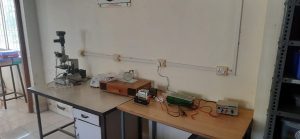
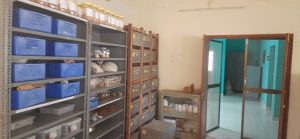
Seed Processing laboratory
Seed Processing laboratory is the laboratory where the work on optimum sieve size and type of screen for grading seeds of different crop varieties and hybrids including their parents is done. Crop-wise classification of varieties in seed chain with respect to their seed size (small, medium and bold) and to standardize the size and type of grading sieve. To study the effect of processing method on quality of different crops and to standardize the processing methods.
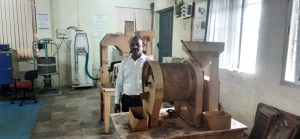
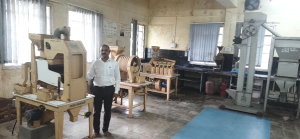
Seed Entomology laboratory and Field
The seed Entomology laboratory is adequately equipped to cater the needs for conduction of the research trails on the storage Entomology. It includes the research aspects on the field as well as in storage Entomology viz. Survey and evaluation of seed health status of farmers’ saved seed with respect to insect infestation, to know the type and level of infestation by insects under storage condition, Impact of insect infestation on seed quality. Farmer’s practice, if any, to store / protect seeds from insect damage. To develop effective eco-friendly, low-cost techniques for the control of bruchids infesting pulse seed, to study the effect of solarization on seed quality attributes of treated seeds. Survey and monitoring of insecticide resistance in storage insect pests infesting seeds in storage godowns to estimate level of resistance to commonly used insecticides in storage godowns. To evaluate commercially available neem formulations against major storage insect-pests damaging seeds and to study the storability of treated seeds.
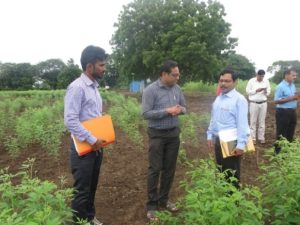 | 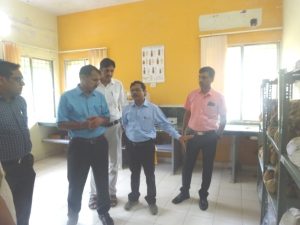 | |
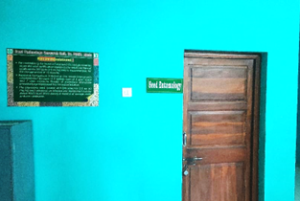 | 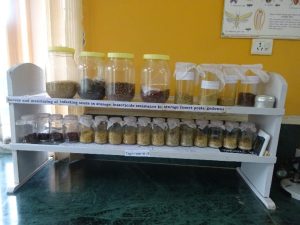 | |
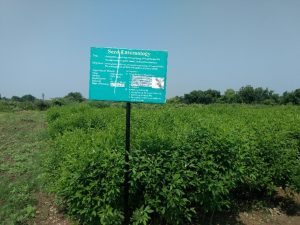 | 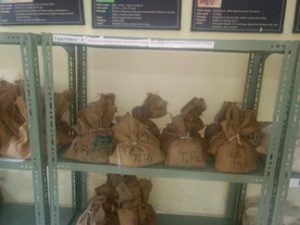 | |
 |
DUS testing field and laboratory
Other than AICRP- NSP activities carried out at STRU, this unit is actively involved in DUS testing and maintenance of mandate crops – pigeonpea, safflower and Mungbean. Various work is carried out at DUS unit which is Characterization of the Pigeonpea varieties under DUS programme as per NTG guidelines. Maintenance of pigeonpea varieties under DUS programme. GOT of varieties received for characterization and Maintenance of Safflower varieties under DUS programme.
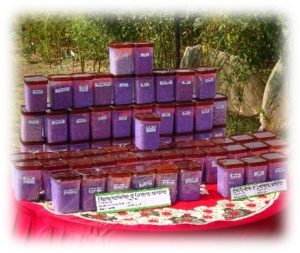 | 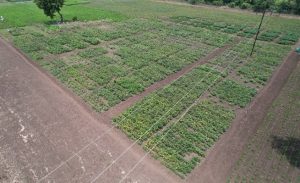 |
DUS Maintenance and testing of Mungbean, Pigeonpea and safflower Genotypes under DUS testing Programme
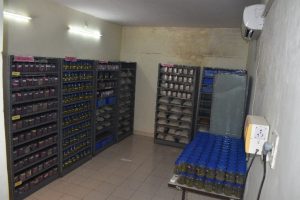
DUS Storage of Mungbean, Pigeonpea and Safflower seeds laboratory
Experimental Field of Seed Technology Research Unit
The Seed Technology Research Unit is having its own research farm of 7.20 ha. for conducting the research experiments of Seed production and certification, Seed Physiology, Seed Entomology, DUS testing field experiments and as well as faculty of the Unit and also catering to the needs of the corporate sector by way of testing their seeds under Agency Trials which also generates revenue for the Unit.
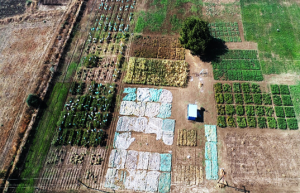
Arial view of the Farm of Seed Technology Research Unit showing research experiments of Seed production and certification, Seed Physiology, Seed Entomology, DUS testing field experiments and as well as faculty of the Unit and also catering to the needs of the corporate sector at STRU, Dr. PDKV., Akola
Infrastructure developed at Field of STRU, Dr.PDKV, Akola
- 1.2 km long, 8 ft. high chain-link Fencing with CCTV Camera and Approach Road:
- Tree plantation at the Auspicious Hands of Honorable Vice Chancellors of all Four SAUs of Maharashtra
- New protective irrigation facilities established at STRU, Dr. PDKV, Akola field:
- The field of STR Unit is expanded from 2.5 ha to 7.2 ha. To meet the increasing demand of protective irrigation to AICRP on Seed (Crops) Experiments and Demonstration, a new Irrigation line with provision of Sprinkler and Drip is made at STRU field.
- Farm Mechanization And Instruments Purchased
- Instruments /Equipment’s purchased
- Sieve Shaker
- Moisture meter
- Selfing structure with Net
- PC sets
- Digital Camera
- 50 HP Mahindra tractor
- Rotavator
- MB plough
- Duck foot type 5 tyne
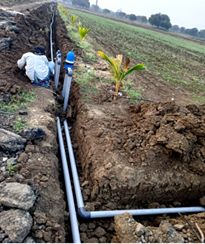
Seminar Hall/Farmers training hall.
The Seed Technology Research Unit, Seminar Hall/Farmers training hall is well equipped with the state of art AV aids. The instructional programme is being implemented with the help of AV aids like interactive LCD, OHP, CD, posters, charts etc.

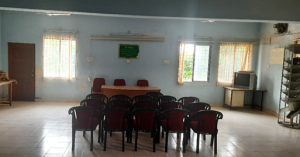
Mandate and Objectives
Presently STR Units is conducting various projects under two major ICAR-IISS schemes viz. AICRP-NSP (Crops) and TSP. The unit is also identified as DUS Testing Centre under PPV & FR Authority, India since 2004 for pigeon-pea and safflower. Along with ICAR – IISS Schemes and DUS testing of mandate crops, the unit is conducting University level experiments pertaining to seed science and technology and also provides the facility of seed testing for various research centres of university. Presently the seed testing laboratory has been notified for Seed Testing by the government of Maharashtra.
Accordingly, the research programme has been planned and undertaken with following objectives under different units viz.
- Seed Physiology, Storage and testing of seeds
- Study the planting value of seeds to examine the prescribed periods of validity of fresh and revalidated certified seed lots of some major field crops.
- To assess the efficiency of molecular markers in hybrid purity testing in comparison to the grow-out test (GOT) in various field crops.
- To validate the identified markers for various hybrids. Development of priming technologies for enhanced planting value of seed under sub-optimal conditions in field crops.
- Validation of standardized priming technologies in pigeon pea for sub- optimal condition. Development of seed enhancement technique for low temperature stress during seedling establishment in maize and paddy.
- Seed Processing
- Optimizing sieve size and type of screen for grading seeds of different crop varieties and hybrids including their parents.
- Crop-wise classification of varieties in seed chain with respect to their seed size (small, medium and bold) and to standardize the size and type of grading sieve.
- To study the effect of processing method on quality of different crops and to standardize the processing methods.
- Seed Entomology
- Survey and evaluation of seed health status of farmers’ saved seed with respect to insect infestation, to know the type and level of infestation by insects under storage condition, Impact of insect infestation on seed quality.
- Farmer’s practice, if any, to store / protect seeds from insect damage.
- To develop effective eco-friendly, low cost techniques for the control of bruchids infesting pulse seed,
- to study the effect of solarization on seed quality attributes of treated seeds.
- Survey and monitoring of insecticide resistance in storage insect pests infesting seeds in storage godowns
- to estimate level of resistance to commonly used insecticides in storage godowns.
- To evaluate commercially available neem formulations against major storage insect-pests damaging seeds and to study the storability of treated seeds
- DUS testing Unit
- Various work is carried out at DUS unit which is Characterization of the Pigeonpea varieties under DUS programme as per NTG guidelines.
- Maintenance of pigeonpea varieties under DUS programme.
- GOT of varieties received for characterization and Maintenance of Safflower varieties under DUS programme.
- Characterization of the Mungbean varieties under DUS programme as per NTG guidelines.
- Field of Seed technology Research Unit.
- Kharif and Rabi experimental trails on seed production and certification, Seed Physiology, Seed Entomology, DUS testing field experiments and as well as faculty of the Unit and testing of seeds under Agency Trials are conducted on field of STRU.
- State Seed Testing Laboratory Notified by Government of Maharashtra STRU, Dr.PDKV, Akola
- Seed testing is determining the standards of a seed lot viz., physical purity, moisture, germination and thereby enabling the farming community to get quality seeds.
- The Seed Testing Laboratory is the hub of seed quality control. Seed testing services are required from time to time to gain information regarding planting value of seed lots. Seed testing is possible for all those who produce, sell and use seeds.
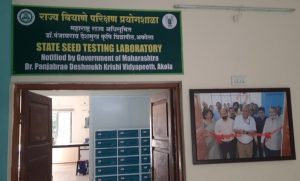
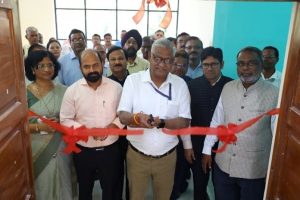 | 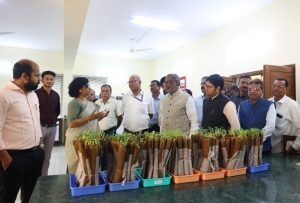 | |
| Inuaguration of State Seed Testing Laboratory at the auspecious hands of Dr. Sanjay Kumar, Director, IISS, Mau , Dr. Sharad Gadakh, VC, Dr. PDKV., Akola and dignitaries | ||
State Seed Testing Laboratory Notified by Government of Maharashtra, STRU, Dr.PDKV, Akola
Objective & Importance of Seed Testing
Seed testing is required to achieve the following objectives for minimizing the risks of planting low quality seeds.
- To identify the quality problem and their probable cause
- To determine their quality, that is, their suitability for planting
- To determine the need for drying and processing and specific procedures that should be used
- To determine if seed meets established quality standards or labeling specifications.
To establish quality and provide a basis for price and consumer discrimination among lots in the market. The primary aim of the seed testing is to obtain accurate and reproducible results regarding the quality status of the seed samples submitted to the Seed Testing Laboratories.
Importance
- The importance of seed testing was realized more than 100 years ago for assured planting values. The adulteration of vegetable seeds by stone dust which was packed in some parts of the world particularly in Europe.
- Seed testing has been developed to aid agriculture to avoid some of the hazards of crop production by furnishing the needed information about different quality attributes , purity, moisture, germination, vigour and health.
- Quality control of seed depends on the different seed testing protocols which determine the genuineness of the cultivar.
- Testing of seed to evaluate the planting value and the authenticity of the certified lot.
- Seed testing is required to assess the seed quality attributes of the seed lots which have to be offered for sale.
- These quality attributes are seed moisture content, germination and vigour, physical and genetic purity, freedom from seed borne diseases and insect infestation. In India, seed testing is done mainly for moisture, germination and physical purity of seeds.
- Standard seed testing procedures for the evaluation of the seeds were developed by ISTA. It is obligatory on the part of the seed analyst to follow rules prescribed by 1STA (1STA, 1985) if the seed is moving to the international trade.
- The seed testing procedures which are described below are based mostly on the international rules because most of our rules (Chalam et . 1967) are based on, 1STA, 1996. Economic yield of a crop depends on the quality of seeds which can be evaluated by seed testing (1STA, 1996).
- The testing of seed quality is carried out on seed samples drawn from seed lot to be used for cultivation. The quantity of seed sample taken for testing in laboratory is minute compared to that of seed lot it represents.
Role of Seed Testing Laboratories
Seed testing laboratories are essential organization in seed certification and seed quality control programmes. The main objective is to serve the producer, the consumer and the seed industry by providing information on seed quality. Test results may cause rejection of poor seed multiplication or low-grade seed in a count of law.
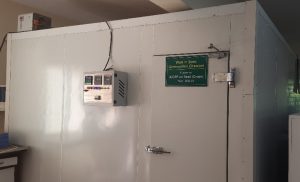 Walk in Seed Germinator Chamber and Seed Testing Laboratory
Walk in Seed Germinator Chamber and Seed Testing Laboratory
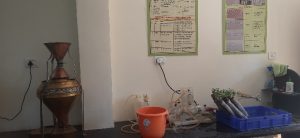 | 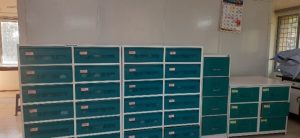 | |
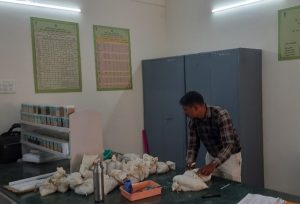 | ||
Analysis of seed in the laboratory: Seed testing is possible for all those who produce, sell and use seeds. Seed testing is highly specialized and technical job. With a view to maintain uniformity in quality control the seed analysis laboratory includes for distinct sections.
- Section for purity testing: Purity analysis of seed lot is considered under two factors
a) Testing the cleanliness of seed lot and b) Testing the geneuiness of the cultivar - Section for moisture testing
- Section for viability, germination and section for vigour testing.
Research Activities and Achievements
On Going Research Programme during 2023-24
- Experiment allotted under AICRP On Seed (Crops)
| Sr.No. | Group | Field (Kharif) | Survey/ Laboratory | Field (Rabi) | Conducted/ Not Conducted | Total number |
| 1 | Seed Production & Certification | 01 | — | 02 | All Conducted | 03 |
| 2 | Seed Physiology, Storage & Testing | 03 | 07 | 0 | All Conducted | 13 |
| 3 | Seed Entomology | — | 07 | — | All Conducted | 07 |
| 4 | Seed Processing | 02 | 03 | — | All Conducted | 05 |
| Total | 06 | 17 | 05 | All Conducted | 28 | |
- Seed Production & Certification
| Sr. No. | Title of Experiment |
| 1. | Seed quality assessment of breeder seed samples |
| 2. | Optimization of seed rate for enhancing seed yield and recovery of pure live seed (Crop: Gram) |
| 3 | Development of controlled & target specific release coating technologies for management of biotic and abiotic stress and for quality seed production. (Crop: Gram) |
- Seed Physiology, Storage And Testing
| Sr. No. | Title of Experiment |
| 1 | To reaffirm the validity periods of certified seeds of field crops (as per the IMSCS regulations) (Crop: Pigeonpea) |
| 2 | Hybrid purity testing using molecular markers in public sector hybrids of field crops. (Crop: Cotton and Sorghum) |
| 3 | Physiology studies and development of priming technologies for enhancing planting value of seed in field crops under optimal and sub-optimal conditions (Crop: Perl millet, Sunflower, Cotton and Kabuli Chickpea) |
| 4 | Use of nano-particles in enhancing seed quality and storability of seeds (Crop: Wheat and Soybean) |
| 5 | Influence of terminal heat stress on seed set, seed yield and quality in field crops. (Crop: Finger millet, Sorghum and Wheat) |
| 6 | Quantification of the seed Vigour in Field Crops Using a Universal Scale (Cotton) |
- Seed Entomology
| Sr. No. | Title of Experiment |
| 1. | Survey and evaluation of seed health status of farmers’ saved seed with respect to insect infestation. |
| 2. | Efficacy of commercially available neem products on storage pest management during storage under ambient condition. (Chickpea and Sorghum) |
| 3. | Studies on the effect of insecticidal seed treatment on seed viability during storage under ambient condition. (Pigeonpea and Sorghum) |
| 4. | Integrated approach for management of Pulse beetle (Callosobruchus sp.) (Pigeonpea) |
| 5. | Studies on the effect of Entomopathogens and inert dust on storage insect pests and seed quality during storage under ambient condition. (Pigeonpea and Chickpea) |
- Seed Processing
| Sr. No. | Title of Experiment |
| 1. | Optimum sieve size and type of screen for grading seeds of different crops, varieties (Chickpea, Pigeonpea and Paddy). |
| 2 | Assessment of postharvest deterioration of soybean seed quality. |
| 3. | Influence of rainfall at maturity physiological quality and seed health of soybean seed |
Research Recommendations
- Seed Production and Certification
- Soybean : The seed yield in reduced seed rate of 60 kg/ha was at par with the recommended seed rate of 70 kg/ha irrespective of sowing method. (2017-18 to 2020-21) The findings were validated in Kharif 2020 with large scale demonstration on 1.20 ha in genotypes JS 335 and PDKV Yellow Gold
- Soybean : Ridge sowing + recommended DAP + soil application of ZnSO4 @ 30 kg/ha along with foliar spray @ 0.5% at 48 and 56 DAS significantly increases pods/plants, seed yield, seed recovery. The ridge and furrow system of sowing with 45 cm row distance for long duration and 30cm for short duration varieties is recommended to realize higher seed yield, quality and higher returns in Soybean. (Year 2015-16)
- Gram (Kabuli) : In Kabuli Chick Pea, seed priming with Carboxin + Thiram (as Vitavax Power) @ 2.5g /Kg seed prior to sowing enhances the plant stand and health that lead to increase in number of pods per plant, number of nodules, seed germination resulting in higher yield. (Year 2018-19)
Seed Physiology, Storage And Testing
- Sorghum : (Year 2017 – 2021) Seeds of sorghum stored under ambient conditions maintains its viability over and above IMSCS up to 14th Thus the seeds can be revalidated once after first validity period of 9 months.
- Chickpea : (Year 2018 – 2021) Seed coating (on hydro. primed seeds for 4 hours) with drought alleviating bacteria + biogrow significantly enhances the planting value of Kabuli chickpea seeds.
- Soybean : (Year 2019- 2021) Seed treatment with nano particles of zinc oxide 500 ppm recorded maximum values for all seed quality parameters than control irrespective of varieties
- Sorghum : (Year 2017- 2021) : Salicylic acid (400 ppm) sprayed at vegetative and anthesis stage of late sown sorghum resulted in higher seed set and seed yield and can be recommended to manage terminal heat stress on seed set, seed yield and quality in field crops.
- Wheat : (Year 2017- 2021) Salicylic acid (400 ppm and 800 pm) sprayed at vegetative and anthesis stage of late and very late sown wheat resulted in higher seed set and seed yield and can be recommended to manage terminal heat stress on seed set, seed yield and quality in field crops.
- Ground nut (Year: 2016-17) : Groundnut seed as kernel can be stored upto five months with desired seed quality as per the IMSCS in 700-gauge thick polythene bags.
- Ground nut (Year: 2017-18) : : Groundnut seeds (off-shell) could be stored for more than six months with 86% germinability and vigor with silica gel (1:0.30) or Zeolite beads (1:0.35) in 700-gauge polythene bags.
- Field Crops (Year: 2018-19) : Foliar spray of salicylic acid @800 ppm and 400 ppm were found to mitigate the influence of terminal heat stress on seed set, seed yield and quality in various field crops.
Seed Entomology
- Pigeonpea (Year 2015 – 2018) : The treatment with Emamectin benzoate @ 2 ppm (40 mg / kg seed) was significantly superior with less insect damage over all the treatments and at par with Deltamethrin @ 1 ppm (0.04 ml / kg seed) and Acorus calamus TNAU Formulation @10ml/kg up to twelve months storage in pigeonpea seeds.
- Pigeonpea (Year 2019- 2021) : Treatment of Neemazal T/S @ 6ml/L (Spraying at 50% pod maturity and maturity) was at par with spraying of (Emamectin benzoate 5 SG @ 0.3 g/L) (Spraying at 50% pod maturity and maturity) with minimum adult emergence and per cent seed damage.
- Pigeonpea (Year 2018 – 2020): Solarization of pigeonpea seeds in clear polythene (700 gauge) packet for 4 h for 6 days resulted in minimum insect infestation
- Storage Pest of Pigeonpea ( Year 2015 – 16) : Seed treatment (ST) with Emamectin benzoate @ 2 ppm a.i. (40.0 mg/kg seed) and fabric treatment (FT) with Emamectin benzoate 100 ppm ai (Proclaim 5SG – 2g /litre) at two months interval can provide better management of storage pests of pigeon pea and maize up to six months of storage. 60 and 120days after seed treatment DAST. ( Year 2015-16)
- Groundnut Pod Borer (Year 2018-19) : Groundnut pod (<10%MC) treatment with Emamectin benzoate (5SG) @ 2 ppm (40 mg diluted in 15ml water/kg of pod) or Spinosad (45 SC) @ 2ppm (4.4 mg diluted in 15ml water/kg of pod) can provide effective management of groundnut pod borer during storage up to 6-9 months under ambient condition without affecting seed quality. Groundnut seed as kernel can be stored upto five months with desired seed quality as per the IMSCS in 700-gauge thick polythene bags. (Year 2018-19)
- Pulse Beetle (2018-19) : Investigations to identify suitable insecticide for pre-harvest spraying for management of pulse beetle among pulses viz., green gram, black gram, chickpea and pigeon pea revealed that spraying of Emamectin benzoate 5 SG @ 0.3 ml/L and Profenophos 50 EC @ 1 ml/L at 50% pod maturity and maturity stage were effective in controlling infestation at both field and storage conditions (seed damage %) recorded at 3, 6 and 9 months of storage.( Year 2018-19)
Seed Processing
- Soybean (Year 2015-16) Studies on management of mechanical damage to soybean seed at harvesting, threshing, processing, handling, transportation stage revealed that the use of combine harvester at 500 rpm of drum speed is found most suitable and economical for harvesting of soybean crop.
- Recommendation submitted to Government of Maharashtra and Seed Processing Industries based on survey of 42 seed processing plant in Maharashtra.
- All seed processing plant should be equipped with essential machines viz., pre-cleaner, cleaner, grader, specific gravity separator, moisture meter, weighing and sealing machine.
- The plant should be operated by technical persons having background with seed and machinery.
- The old machines should be replaced with new machines for achieving better efficiency, seed recovery and quality seed.
- There is urgent need to improve seed storage facility of seed processing plant in order to maintain the seed quality viz., germination, physical purity, vigour etc., all along the storage period.
- Specific gravity separator is recommended for upgrading the marginal seed lots having lower germination percentage by about 10% than MSCS in cotton, soybean and safflower to an acceptable limit.
- In the present era of high yielding crop varieties/ hybrids, there is need to modify the size of the bottom/ grading screen to improve the quality and quantity of the seed and to meet the physical purity standards set by IMSCS.
Table 1: Modifications Proposed for Bottom/ Grading screen in Appendix VII (SCREEN APERTURE SIZE FOR SEED PROCESSING) of INDIAN MINIMUM SEED CERTIFICATION STANDARDS 2013
Crop / Seed Size (categories) | IMSCS Recommended Sieve Size (mm) | Standardized Sieve Size (mm) | Modifications proposed |
| Paddy | |||
| Coarse grain/ Bold type | 1.85s | 1.85s, 2.00s | 1.85s, 2.00s |
| Medium Slender | 1.80s | 1.80s, 1.90s | 1.80s, 1.90s |
| Fine/ Super fine | 1.70s | 1.60s | 1.60s, 1.70s |
| Chickpea | |||
| Kabuli/ Very bold | 5.0r, 5.5r, 6.0r | 6.5r | 5.0r, 5.5r, 6.0r, 6.5r |
| Pigeonpea | 3.20s, 4.00r,4.75r | 3.75r, 5.00r | 3.20s, 3.75r, 4.00r, 4.75r, 5.00r |
Table 2: Modifications Proposed for Bottom/ Grading screen in Appendix VIII (SCREEN APERTURE FOR SEED PROCESSING OF CERTAIN VARIETIES) of INDIAN MINIMUM SEED CERTIFICATION STANDARDS 2013
S. No. | Name of the Crop | Varieties /Hybrids | Recommended Bottom Screen Size in millimeter |
| 1 | PADDY | Sakoli– 6, | 2.00 s |
| PKV Tilak, PKV Kisan, PKV HMT | 1.60 s | ||
| 2 | CHICKPEA | Caffa, PDKV Kanchan, Jaki 9218 | 5.50 r |
| PKV Kabuli-2, Vijay, Phule Vikram, Phule Vikrant, Digvijay, Vishal | 6.50 r | ||
| Virat | 7.00 r | ||
| 4 | PIGEONPEA | PKV Tara, BSMR 736 | 4.00 r |
Technologies released by Dr. PDKV, Akola and its adoption STRU, Dr. PDKV, Akola
19In Kabuli Chick Pea, seed priming with Carboxin + Thiram (as Vitavax Power) @ 2.5g /Kg seed prior to sowing enhances the plant stand and health that lead to increase in number of pods per plant, number of nodules, seed germination resulting in higher yield.2018-19AdoptedAdopted by farmers and seed growers
| SN | Technology Developed | Year | Status | Adopting agency/ stake holders | ||
| 1 | For maintaining seed quality, soybean crop should be threshed by multicrop thresher at 500 rpm at 12 to 14 % moisture content | 2001-02 | Adopted | Adopted 30 % seed growers all over Maharashtra. | ||
| 2 | For grading soybean cultivars a sieve of 3.6 mm may be used in place of presently recommended 4.0 mm sieve. | 2004-05 | Adopted | 100 % adopted by all seed industries under Maharashtra State Seed Certification Agency. 82,561 qt. seed saved per year of costing Rs.66,48,880/- with additional benefit. | ||
| 3 | The treatment of 100ml H2SO4 for 10 minutes is recommended for wet acid delinting of cotton seed. | 2004-05 | Adopted | 100 % adopted by all seed industries under Maharashtra State Seed Certification Agency. | ||
| 4 | It is recommended that for minimizing mechanical damage and maintaining seed quality inclined belt conveyor should be used in place of bucket conveyor while processing of soybean at seed processing plant. | 2007-08 | Adopted | Adopted by seed industries. 37,742 qt seed save per year of costing Rs.30,19,360/- incase of soybean. | ||
| 5 | Specific gravity separator is recommended for upgrading marginal seed lots having lower germination percentage by about 10% than MSCS in cotton, soybean and safflower to an acceptable limit. | 2007-08 | Adopted | Adopted by 80 % seed industries in Maharashtra. 10 % additional benefit obtained in each crop. | ||
| 6 | For grading seed of safflower varieties a sieve of 2.2mm(s) may be used in place of presently recommended 1.2mm | 2008-09 | Adopted | 100 % adopted by all seed industries under MSSC Agency. | ||
| 7 | It is recommended that an isolation distance of 5m should be adopted in place of existing 3m for maintaining the genetic purity in seed production of soybean. | 2008-09 | Adopted | 100 % adopted by all seed growers under Maharashtra State Seed Certification Agency. | ||
| 8 | Polymer coating @3 ml/kg seed in combination with flowable thiram @2.4 ml/kg of soybean seed before storage is recommended for maintaining the seed quality of soybean for 12 months storage and higher yield. | 2013-14 | Adopted | 15 % seed industries have started this technology. | ||
| 9 | Pre-sowing hydropriming seed treatment for 8 hrs with 1:2 seed : water ratio followed by drying at room temperature to normal moisture content (2 days) is recommended for expected and uniform field emergence, plant stand establishment and improving seed yield in pigeonpea. | 2013-14 | Demonstrated and adopted | 300 farmers used this technology. Average increment of 0.88qt/acre; so total additional benefit of Rs. 26,28,000/- per year. | ||
| 10 | It is recommended that for grading of paddy varieties a sieve of 1.4mm for fine and 1.6mm for coarse varieties may be used in place of presently recommended 1.8mm sieve. | 2013-14 | Adopted | 100 % adopted by all seed industries under Maharashtra State Seed Certification Agency. 9% in coarse and 13% in fine varirities seed saved per year. | ||
| 11 | The specific gravity separator is recommended for removing the ODV seeds in paddy. | 2013-14 | Adopted | 100 % adopted by all seed industries under Maharashtra State Seed Certification Agency. 7% seed saved per year with additional benefit. | ||
| 12 | Two sprays @ 250 ppm of Maleic Hydrazide, first at 50 days followed by 60 days after sowing is recommended for inducing upto 35 days in greengram. | 2014-15 | Adopted | Adopted by farmers and seed growers. | ||
| 13 | Seed treatment (ST) with Emamectin benzoate @ 2 ppm a.i. (40.0 mg/kg seed) and fabric treatment (FT) with Emamectin benzoate 100 ppm ai (Proclaim 5SG – 2g /litre) at two months interval can provide better management of storage pests of pigeon pea and maize up to six months of storage. 60 and 120days after seed treatment DAST | 2015-16 | Adopted | Adopted by farmers and seed growers | ||
| 15 | Ridge sowing + recommended DAP + soil application of ZnSO4 @ 30 kg/ha along with foliar spray @ 0.5% at 48 and 56 DAS significantly increases pods/plants, seed yield, seed recovery. The ridge and furrow system of sowing with 45 cm row distance for long duration and 30cm for short duration of soybean varieties is recommended to realize higher seed yield, quality and higher returns. | 2015-16 | Adopted | Adopted by farmers and seed growers | ||
| 16 | Groundnut seed as kernel can be stored upto five months with desired seed quality as per the IMSCS in 700-gauge thick polythene bags | 2016-17 | Adopted | Adopted by farmers and seed growers and seed industries. | ||
| 17 | Emamectin benzoate 5SG @ 2 ppm a.i. (40.0 mg/kg seed) or Spinosad 45 SC @ 2 ppm i.e. (4.4 mg/kg seed) or deltamethrin 2.8 EC @ 1.0 ppm i.e. (0.04ml /kg seed) treated seeds (at 10% moisture content) stored in moisture impervious bags provide safer storage up to 6-9 months in coastal region for groundnut seed. | 2016-17 | Adopted | Adopted by farmers and seed growers | ||
| 18 | Groundnut seeds (off-shell) could be stored for more than six months with 86% germinability and vigour with silica gel (1:0.30) or Zeolite beads (1:0.35) in 700-gauge polythene bags. | 2017-18 | Adopted | Adopted by farmers and seed growers | ||
| 20 | Foliar spray of salicylic acid @800 ppm and 400 ppm were found to mitigate the influence of terminal heat stress on seed set, seed yield and quality in sorghum hybrid CSH-14 crops. | 2018-19 | Adopted | Adopted by farmers and seed growers | ||
| 21 | The pre-harvest spraying for management of pulse beetle among pulses viz., greengram, blackgram, chickpea and pigeonpea revealed that spraying of emamectin benzoate (5 SG) @ 0.3 gm/L and Profenofos (50 EC) @ 1.0 ml/L at 50 % pod maturity and maturity stage, were effective in controlling infestation at both field and storage condition | 2018-19 | Adopted | Adopted by farmers and seed growers. | ||
| 22 | Groundnut pod (<10%MC) treatment with Emamectin benzoate (5SG) @ 2 ppm (40 mg diluted in 15ml water/kg of pod) or Spinosad (45 SC) @ 2ppm (4.4 mg diluted in 15ml water/kg of pod) can provide effective management of groundnut pod borer during storage up to 6-9 months under ambient condition without affecting seed quality | 2018-19 | Adopted | Adopted by farmers and seed growers | ||
| 23 | It is recommended that for grading of paddy varieties Sakoli– 6, a sieve of 2.0s mm, and PKV Tilak, PKV Kisan, PKV HMT a sieve of 1.60s mm may be used in place of presently recommended 1.8mm sieve | 2019-20 | Adopted | In process of 100 % adoption by all seed industries under Maharashtra State Seed Certification Agency. 9% seed will be saved per year with additional benefit. | ||
| 24 | It is recommended that for grading of chickpea varieties Caffa, PDKV Kanchan, Jaki 9218, a sieve of 5.5.0r mm, and PKV Kabuli-2, a sieve of 6.50r mm may be used in place of presently recommended 5.5mm sieve | 2019-20 | Adopted | process of 100 % adoption by all seed industries under Maharashtra State Seed Certification Agency. 9% seed will be saved per year with additional benefit. | ||
| 25 | It is recommended that for grading of Pigeon-pea varieties PKV Tara, BSMR 736, a sieve of 4.0r mm may be used in place of presently recommended 4.5mm sieve | 2019-20 | Adopted | process of 100 % adoption by all seed industries under Maharashtra State Seed Certification Agency. 9% seed will be saved per year with additional benefit. | ||
| 26 | Solarization of seeds (properly dried) in clear polythene packet for 6 days (4 h on each day) during summer season sunny days can manage insect damage and maintain higher seed germination upto 9-12 months of storage of chickpea, green gram and black gram. | 2021-22 | ||||
| 27 | Preharvest spraying of neem formulation (containing 10000 ppm Azadirachtin) @ 6ml/L at 50% pod maturity and maturity stage can be used for controlling field infestation of pulse bruchid and subsequent adult emergence during storage of pulse seeds (black gram, green gram, chickpea and pigeon-pea) | 2021-22 | ||||
| 28 | Standardization of isolation for hybrid seed production in pigeon-pea | 2022-23 | ||||
| 29 | कपाशी मध्ये शिफारशीत एकात्मिक कीड व्यवस्थापन तंत्रज्ञानाचा अवलंब केल्यास उत्पादकते मध्ये ३० टक्के नी वाढ होते, करिता कापूस लागवडी मध्ये शिफारशीत एकात्मिक कीड व्यवस्थापनाचा व्यापक प्रमाणात अवलंब करण्याकरिता विस्तार यंत्रणेमार्फत प्रचार व प्रसार करण्यात यावा अशी शिफारस करण्यात येते. | |||||
| 30 | Reaffirming the validity periods of seed certification in field crops Inference based on storability studies conducted under ambient conditions at diverse locations reaffirmed the validity period of 9 months for initial certification in barley, 126 Kabuli chickpea, lentil, mustard, oats, pigeon pea and sunflower, to safeguard against any crop failures due to unwarranted seed deterioration in seed lots stored in agro-climatic conditions of high humidity and temperature | 2022-23 | ||||
| 31 | Seed biopriming/coating on hydro primed (4h @ 20°C) seed with Drought Alleviating Bacteria + Biogrow on kabuli chickpea Seed yield enhanced up to 19.8% with maximum B:C ratio of 1.78 | 2022-23 | ||||
| 32 | Spraying of salicylic acid @ 800ppm and 400ppm as foliar sprays were found to mitigate the influence of terminal heat stress on seed set, yield, and quality in various field crops | 2022-23 | ||||
| 33 | Optimization of aperture size of bottom/ grading sieves for processing of new crop varieties. In case of fine/superfine paddy varieties the recommended sieve size of 1.70s resulted in loss of physically pure seed. Hence, sieve size of 1.60s is recommended to increase the pure seed recovery by 3-4 % | 2022-23 | ||||
 | 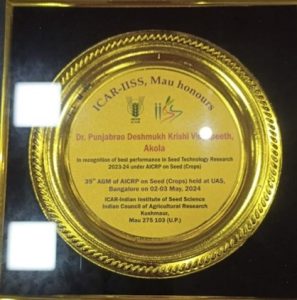 |  |
Seed Technology Research Unit, Dr.PDKV, Akola received the best performance in Seed Technology Research under AICRP on Seed (Crops) for the year 2023-24 during 39th Annual Group Meeting of AICRP on Seed (Crops) held at UAS, Bengaluru on 02-03 May 2024
Extension Activities
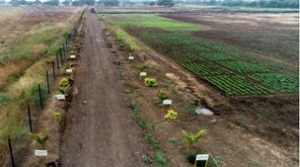 | 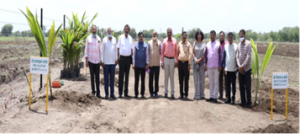 |
Orchard Planting done at STRU field by Hon’ble Vice Chancellors of Agriculture Universities of Maharashtra
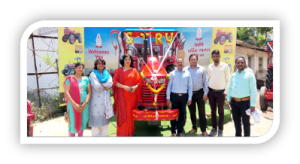 | 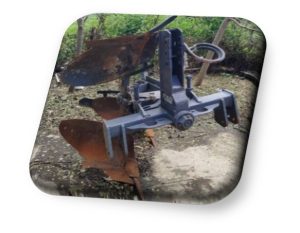 | |
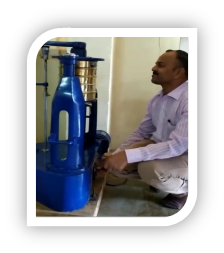 | 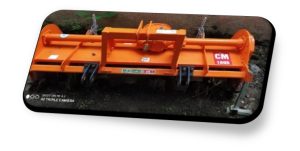 | |
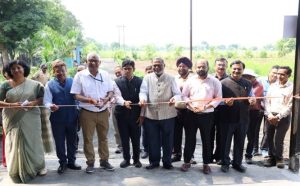 | 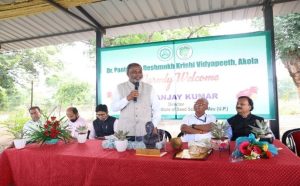 |
Inuaguration of Covered Threshing Floor at the field of STR. Unit, Dr. PDKV., Akola Dr. Sanjay Kumar, Director, IISS, Mau , Dr. Sharad Gadakh, VC, Dr. PDKV., Akola and dignitaries
Implementation of Tribal Sub Plan
Under Tribal Sub Plan: Training on Promotion of Seed Treatment and Seed Storage techniques for Kharif and Rabi crops in tribal areas.
Topics covered are:
- Different seed borne diseases and its management.
- Seed dressing and different seed treatment demonstration for variety of crops.
- Seed production technique and post-harvest management.
- Seed storage and testing.
Target Crops: Rabi:
- Chickpea
- Wheat
- Spices
Kharif:
- Soybean
- Pigeonpea
- Sorghum
- Maize
- Green gram
- Black gram
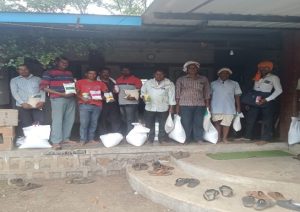
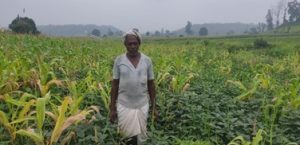

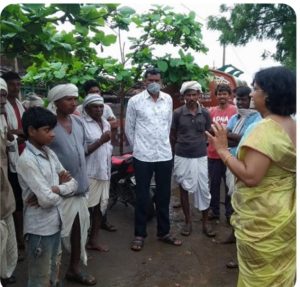


Training and distribution of the Farm inputs to Tribals, Tal. Chikhaldara, Dist. Amravati
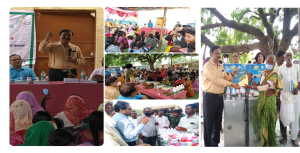
Training and distribution of the Farm inputs to Tribals, Tal. Barshitakli, Dist. Akola
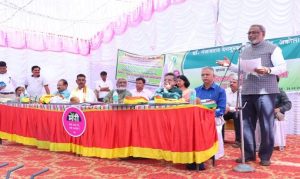

Dr. S. R. Gadakh, Hon’ble Vice Chancellor, Dr. PDKV, Akola address tribal farmers and distributed Farm inputs (Vermi Compost Bed) during “Tribal Krishi Melawa” at Chilati, Tal. Chikhaldara, District Amravati on 24/02/2023

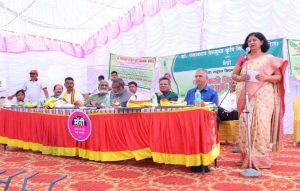
Visit of Dr. S. R. Gadakh, Hon’ble Vice Chancellor, Dr. PDKV, Akola and dignitaries to Ashram Shala Stall and Dr. Amrapali Akhare, SRO, STRU addressing during “Tribal Krishi Melawa” at Chilati, Tal. Chikhaldara, District Amravati on 24/02/2023
Contact Information
Seed Research Officer
Seed Technology Research Unit
Dr. PDKV, Akola- 444104 (MS)
Mobile No. 7020909738
Email : seed_technology@yahoo.co.in
seed_technology@pdkv.ac.in
